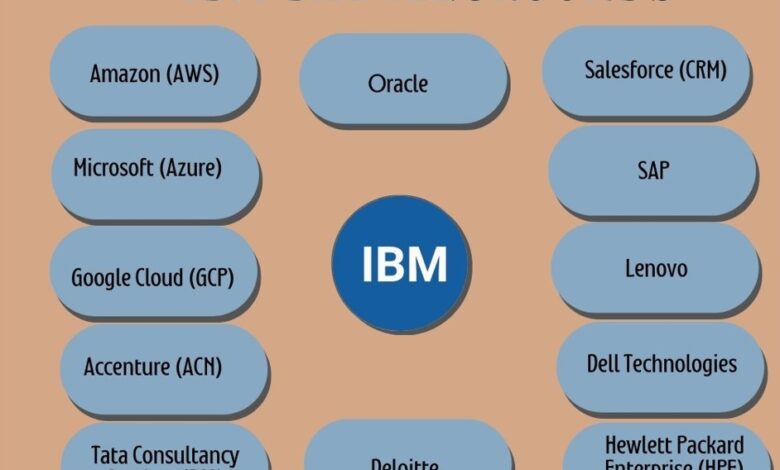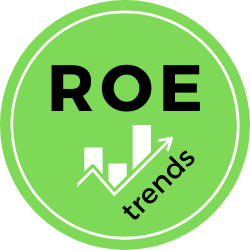IBM Competitors Analysis

This IBM competitors analysis examines the forces shaping the competitive environment for International Business Machines Corporation (IBM). The list of IBM competitors spans a diverse range of companies across cloud computing, artificial intelligence, IT consulting, and hardware. Understanding the strengths and weaknesses of IBM competitors provides critical insights for evaluating IBM’s long-term growth potential and the attractiveness of IBM stock.
IBM Competitors => Diverse Battlegrounds
IBM, with its century-long legacy, remains a pivotal player in the technology sector. Its business segments include hybrid cloud platforms, artificial intelligence, consulting, IT infrastructure, and financing. This diverse portfolio places IBM in competition with numerous companies across multiple technology domains, highlighting the significance of analyzing IBM competitors to understand its market positioning.
Key IBM Competitors and Comparison
| Competitor | Market Cap ($B) | Primary Area of Competition | Strengths | Weaknesses |
|---|---|---|---|---|
| Amazon (AWS) | 1,180 | Cloud Computing | First-mover advantage, massive scale, comprehensive cloud services, strong brand. | Complex pricing, increased competition, regulatory scrutiny. |
| Microsoft (Azure) | 2,790 | Cloud Computing, Software, AI | Integration with Microsoft products, enterprise focus, growing cloud ecosystem. | Dependency on broader Microsoft ecosystem performance, less mature cloud services compared to AWS in some areas. |
| Google Cloud (GCP) | 1,710 (GOOGL) | Cloud Computing | Innovation in AI and data analytics, strong focus on cloud-native applications. | Late market entry, smaller market share compared to AWS and Azure. |
| Accenture (ACN) | 227 | IT Consulting and Services | Global reach, deep industry expertise, diversified portfolio. | High labor costs, dependency on global economic trends. |
| Tata Consultancy (TCS) | 169 | IT Consulting and Services | Cost-effective services, strong talent pool, digital transformation expertise. | Reliance on Indian market, limited premium client base in North America. |
| Deloitte | ~50 (Private) | IT Consulting and Services | Global network, expertise across industries, strong audit and advisory reputation. | Potential conflicts of interest with audit services, slower tech adoption. |
| HPE (Hewlett Packard) | 22 | Hardware and Infrastructure | Hybrid IT focus, strong enterprise hardware portfolio. | Struggles to compete with cloud-native infrastructure offerings. |
| Dell Technologies | 51 | Hardware and Infrastructure | Broad product portfolio, strong direct sales model, enterprise hardware expertise. | Dependence on PCs and traditional hardware markets, increasing cloud competition. |
| Lenovo | 15 | Hardware and Infrastructure | Competitive pricing, strong global presence in PC markets. | Limited brand recognition in enterprise sectors, smaller footprint in servers and storage. |
| SAP | 164 | Software and AI | Enterprise software leader, strong ERP and supply chain solutions. | Expensive and complex software, challenges adapting to cloud trends. |
| Salesforce (CRM) | 237 | Software and AI | Cloud CRM leader, innovative, customer-focused. | CRM market dependency, growing competition from other cloud-native CRM providers. |
| Oracle | 329 | Software and AI | Extensive database expertise, strong enterprise footprint. | Transition to cloud slower than competitors, reputation for high costs and complex solutions. |
Analyzing the strengths and weaknesses of these IBM competitors sheds light on the diverse challenges and opportunities IBM faces.
Competitive Advantages and Disadvantages
Amazon (AWS)
- Strengths: First-mover advantage, massive scale, comprehensive suite of services, strong ecosystem of partners.
- Weaknesses: Complex pricing structures, heightened competition from other cloud providers, regulatory scrutiny.
Microsoft (Azure)
- Strengths: Seamless integration with Microsoft products, enterprise-grade services, robust ecosystem of partners.
- Weaknesses: Dependency on broader Microsoft ecosystem performance, less mature in some cloud areas compared to AWS.
Google Cloud (GCP)
- Strengths: Strong innovation in AI, focus on data analytics, growing presence in cloud-native solutions.
- Weaknesses: Later market entry compared to AWS and Azure, smaller market share in cloud.
Accenture (ACN)
- Strengths: Industry-leading consulting expertise, global presence, diversified service offerings.
- Weaknesses: High operating costs, dependency on global economic conditions.
Tata Consultancy Services (TCS)
- Strengths: Competitive pricing, expertise in digital transformation, large workforce.
- Weaknesses: Limited brand presence in premium markets like North America, dependence on Indian market revenues.
Deloitte
- Strengths: Extensive global network, expertise across diverse industries, trusted audit and advisory services.
- Weaknesses: Potential conflicts of interest with audit practices, slower technology adoption compared to tech-driven competitors.
Hewlett Packard Enterprise (HPE)
- Strengths: Focused on hybrid IT solutions, strong portfolio in enterprise hardware.
- Weaknesses: Struggles to compete with cloud-native solutions, reliance on legacy infrastructure offerings.
Dell Technologies
- Strengths: Broad enterprise product portfolio, strong direct sales approach.
- Weaknesses: Heavy reliance on PC markets, rising competition from cloud-based offerings.
Lenovo
- Strengths: Competitive pricing strategies, significant global presence.
- Weaknesses: Smaller enterprise footprint, less brand equity in server and storage markets.
SAP
- Strengths: Market leader in ERP solutions, strong enterprise software ecosystem.
- Weaknesses: Expensive, complex implementation processes, facing competition from cloud-native ERP providers.
Salesforce (CRM)
- Strengths: Leader in CRM solutions, strong growth, innovative products.
- Weaknesses: Dependency on CRM market, increasing competition from other cloud-native providers.
Oracle
- Strengths: Broad enterprise software portfolio, leadership in database technologies.
- Weaknesses: Transition to cloud slower than competitors, reputation for costly solutions.
Key Differentiators for IBM
- Hybrid Cloud Focus: IBM’s cloud platform offers seamless integration across public and private infrastructures, appealing to enterprise clients.
- AI Expertise: Watson AI platform strengthens IBM’s foothold in artificial intelligence solutions.
- Enterprise-First Strategy: IBM tailors its offerings to the unique needs of large enterprises, setting it apart from consumer-focused IBM competitors like AWS and GCP.
Investor Considerations
Market Share Trends
IBM must demonstrate competitive gains in high-growth areas like hybrid cloud and AI to maintain relevance against IBM competitors like Microsoft and Oracle.
Financial Metrics
- IBM’s revenue growth has stabilized but lags compared to faster-growing IBM competitors in cloud and AI.
- Profitability metrics need monitoring, especially as investments in new tech impact margins.
Innovation Capacity
IBM’s success in areas like quantum computing and AI will be critical in outpacing its IBM competitors.
Valuation and Comparisons
IBM stock should be evaluated based on its market share, dividend yield, and strategic pivot toward hybrid cloud relative to other IBM competitors.
ESG Commitments
IBM’s sustainability initiatives may impact its attractiveness to socially conscious investors.
Conclusion
You can find a very broad and simple solution in the competitive environment of a giant like IBM, which fights on many platforms. It includes cloud, artificial intelligence, IT investment and hardware. While IBM’s competitors such as AWS, Microsoft and Accenture dominate in certain areas, IBM’s truly flexible hybrid cloud strategy and enterprise solutions give IBM a significant competitive advantage. As one of the locomotives of technology, IBM continues to innovate and leverage rich technologies and leverage legacy strengths. We recommend that our readers who are curious about IBM’s financial statements visit the IBM Investor Relations.

